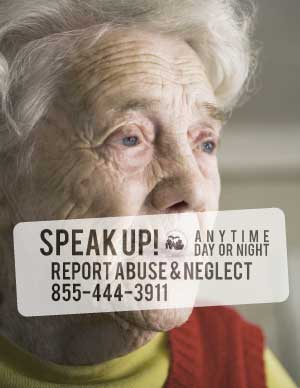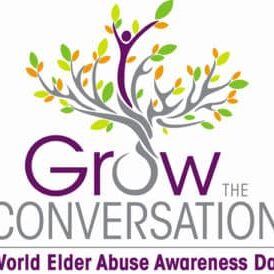The Washtenaw County Elder Justice Coalition is a group of health and social service practitioners and community members working to acknowledge and prevent elder abuse in Washtenaw County through awareness, education, advocacy, and enhanced partnerships.
Recently we spoke with Rashanna Davis of Adult Protective Services (APS), Adult Protective Services investigators protect vulnerable adults from abuse, neglect and exploitation by coordinating with mental health, public health, law enforcement, the probate courts, the aging network, community groups and the general public. In this interview, Rashanna discusses what APS does in detail, how they do it, and ways you can support loved ones or community members that may need additional support.
Ahead of the Curve: If you had to give an “elevator speech” about what your organization does, how would you describe it?
Rashanna Davis: Okay, so I work for the Department of Health and Human Services, which is a State of Michigan Entity. Housed within that are a couple different agencies, specifically Human Services does all of your government entitlements- food assistance, Medicaid, etc. Also housed under that is the child welfare program and the adult services program. Specifically, I work for Adult Protective Services and we investigate complaints of abuse and neglect of the elderly, as well as vulnerable adults. Also housed under the adult service program is our Home Health Program which provides caregiver services for people who have Medicaid.
AOTC: What happens when you get a phone call/referral?
RD: The phone call actually comes into our central intake department, so that’s been around for about five years. A person calls the hotline, they give all their information that they have of their concern and the central intake person puts it in the computer and they decide whether or not the adult qualifies. For our program you need to have vulnerability, which is sometimes just age, but can also be disability, illness, mental illness, and you have to be above the age of 18. If they [the central intake] decide that it is appropriate for investigation, they send it to the county that the person resides in. That’s when it gets to me!
AOTC: How long does the process take?
RD: Usually we get 24 hours to do what’s called “commencing a case,” which is just literally starting the investigation (maybe figuring out where they’re at, are they well, etc.). Then we have about three days to make face-to-face contact and get the information we need. Occasionally I won’t have an address, or I may know they’re in the hospital, but not know what hospital, so there is a little bit of before work.
AOTC: What organizations do you work closely with?
RD: Sometimes it’s just really us! We don’t work with other organizations so much as we work with hospitals, but we do also work a lot with the Area Agency on Aging. We are sending people to them for help; they have a couple of programs that provide caregiver services at home. We work with the [Washtenaw County] Hoarding Task Force quite a bit when we get hoarding cases. The other organizations we work with are the local organizations that provide care for our clients. Mostly it’s doctors, hospitals, social workers, St. Joe’s home nursing, Michigan Visiting Nurses, and the Area Agency on Aging. Right now, I’m trying to partner with other services and agencies that work with our clients, like pest control or cleaning services. It’s a process.
AOTC: What are some things you wish the public knew about your role?
RD: The biggest thing that I would like people to understand is the adult protection piece is similar but different in a very important way from children’s services in that children ultimately have someone to care for them, but adults are- for the most part- their own caregivers. As an adult you get to do what you want and live how you want. I think sometimes people, including professionals, want us to swoop in and put people somewhere. If my clients want to live that way (like with hoarding) and they’re competent to do so, they get to do that. I think that’s the biggest thing I want people to understand. I get it, we’re all very worried about the person, but if these are their wishes, we have to let them do it. And it’s really hard! Adults don’t have to make good decisions, and we can’t make them. That’s probably the hardest part of this job. Even in those cases I do try to still say “hey, here are some resources if you ever do change your mind call me and we can get you hooked up with people to help you.”
AOTC: What tips do you have for someone with a loved one that needs assistance?
RD: My recommendation to someone who’s wondering if they should call [APS], they should just call. We’re going to decide if it meets our criteria. Be sure to get as much information and details as you can before you call. Always be offering support and help to a loved one, try to connect them to resources. Again, if they don’t want help, you just have to leave it, but let them know that you’re there. Be checking in, especially if they live alone.
AOTC: Is there anything you would like to add?
RD: There’s one more thing that I want people just to understand: when it comes to caring for yourself in your older years you either have to be really rich or really poor to really have access to things. My clients that worked a blue-collar job and have a little bit of social security, it’s like they make too much to tap into the free services, but they also don’t make enough to go live in ritzy assisted living. Those are the people that end up holding on to their independence a little longer than we’re comfortable with. Ultimately everyone qualifies for Medicaid, but you literally have to give up your everything; you have to liquidate assets, you may have to give up your house and that’s hard for a person to wrap their head around! My job is to keep people in the least restrictive environment as possible while maintaining their safety.
Also, sometimes I think family or children feel like their parent’s savings or home should be passed down to them. Ultimately, their money is to pay for their care when they get older. If selling the house can extend their life and the quality of their life, then that’s what it should be used for. Advocate for your loved ones, whether it be hospitals, or even when APS shows up. Whatever services are in their home, speak up for them because you know them and have their best interests at heart!
Thank you to Rashanna Davis for helping us demystify Adult Protective Services. If you want to learn more about APS, you can visit their website or look up the office closest to you.
If you suspect that someone you know may be abused, neglected, or exploited, call the Michigan Adult Protective Services 24-hour hotline: (855) 444-3911






